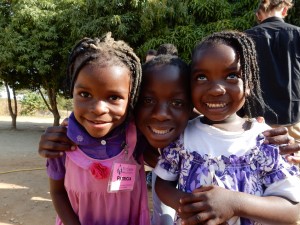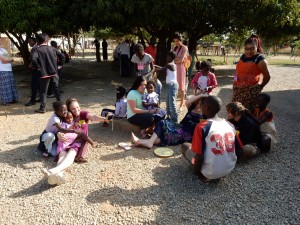
Kathy Headlee Miner firmly believes that everyone in this world loves her.
“Every single human being on the planet, every one, in every country, loves me. Adores me,” she said with a smile. “And I know that I love every single person on the planet in that same way. Some have just forgotten.”
For Miner it has been a long journey of learning, including many humanitarian trips to disaster scenes, nearly two decades of running an orphanage in Zambia, and countless life lessons, but she knows one thing for sure: love works.
“There is but one problem and one solution,” she said in her Education Week presentation, quoting Marianne Williamson’s “A Return to Love.” “All problems are a deviation from love, and all solutions are a return to it.”
Miner, founder of the non-profit Mothers Without Borders, focused her remarks on how to fill one’s heart with grace, compassion, understanding and hope, and use these feelings to overcome grief, anxiety and trauma.
Each person gets to choose what to fill their heart with, she said. Part of that journey is learning to take down the protective walls that can prevent individuals from filling their own heart with bliss and magnificence. Fear-based emotions, such as frustration, guilt, hopelessness and despair, are all creations of the ego-self, or the “natural man,” and cover up the divine, love-based qualities that are within each person.
“It’s really a journey of remembering. Of coming back to who you are. Of coming back to who you were created to be,” she said.
She emphasized that happiness is a choice, and people can choose to be happy and hopeful no matter their circumstances.
One year in Zambia she went to visit an old friend, a 90-something-year-old woman who lived in a small concrete house and took care of several orphans. She found the woman in bed with a broken arm and several broken ribs, and proceeded to find out that she had been robbed and beaten the night before by a group of men, one of whom was her oldest son.
Miner said while the woman was calm, as an observer she was absolutely inconsolable and could not stop weeping. They sat on the porch together, Miner weeping, and the woman softly patting her arm. That’s when Miner noticed a pot of water was boiling on the stove in the yard. Seeing that there was no food in the pot, she turned to the woman’s daughter and asked, “Why on earth are you boiling water?” She knew how difficulty and costly it was to find water and fuel, and she was instantly frustrated that they would be wasting it.

But the woman’s daughter responded calmly, “Mom said, ‘If you boil the water, God will send us food.'”
Miner instantly jumped up with joy, remembering that she had brought bags of food with her to give to the family.
“(The woman) was feeling peace because of years of practicing who she authentically is among difficult circumstances,” she said. “In difficult circumstances, do I have the faith to boil the water?”
She suggested a few steps on how to get out of a fear-based state, whether it be anger, despair, jealousy or discouragement.
First is simply recognizing both the emotion, and that the ego-self has taken control.
“Attention is one of your greatest resources,” she said.
The next step is to be present.
She regularly encouraged her audience to stop and take a breath to bring them back to the present, saying “You cannot breath in the future and you cannot breath in the past.”
She said most people only spend 3-5 percent of their day in the present, and emphasized the importance of learning to correct that. While individuals can learn from the past and prepare for the future, she said, ruminating in the past and worrying about the future are not present activities and take away personal power. “You have power right here right now. You have power to change, you have power to choose,” she said. “The eternal now is always renewing. …Right here, right now, you can be peace. Right here, right now, you can be joy.”
The third step is to set an intention to choose love. She said science has shown that responsive emotions, such as anger and frustration, only physically stay in a person’s body for 90 seconds. After that, they can persist for minutes, hours and even years, but only if individuals feed them.
“Don’t give them more than 90 seconds of your life,” she encouraged.
The fourth step is to go to gratitude, which she said is the bridge to love-based, godlike emotions. Thinking of something that one is truly grateful for will open up one’s heart.
The last step is to choose the opposite, counterpart emotion to what one was feeling. A frustrated person might choose patience; a discouraged person might choose hope. She emphasized the importance of saying the words out loud, “I am patient,” until one truly feels patient.
“If you’re still feeling a remnant of fear, consciously, intentionally give it up to the Savior,” she said. “That is the enabling power of the Atonement. Ask him, ‘Will you take these remnants of anger away from me?'” She testified that every time she does this, the Savior frees her.

Next, she spoke of the freeing, delivering power of forgiveness, denouncing the false belief that withholding forgiveness is a protection from further hurt.
“Refusing to forgive and believing that it will somehow protect you is a lie, because it is separating you from your creator and your Savior,” she said, noting that forgiveness is a process that takes time.
She shared a story of a young girl named Carol, whom she met in Zambia. Carol was abused by her uncle when she was very young and as a result, contracted HIV and AIDS and became very sick. Miner brought Carol into her orphanage, where the girl lived for many years, but she could not be cured.
She said one day when Carol was 12, she asked Miner why Miner didn’t forgive Carol’s uncle for what he had done to her. Miner said she was taken aback by the question, and asked Carol, “How do you forgive him?”
She said Carol’s eye’s widened in surprise and she answered, “God loves him. And I love God.”
Carol died soon after, but Miner said the girl was one of her greatest teachers.
Miner emphasized her love — and God’s love — for all members of the audience, and encouraged them that they have more power than they think.
“The truth is that as you change you, you change the course of human history,” she said. “That should be empowering. As you change you, you will change the world.”




